高中英语定语从句知识点归纳
高中英语定语从句知识点
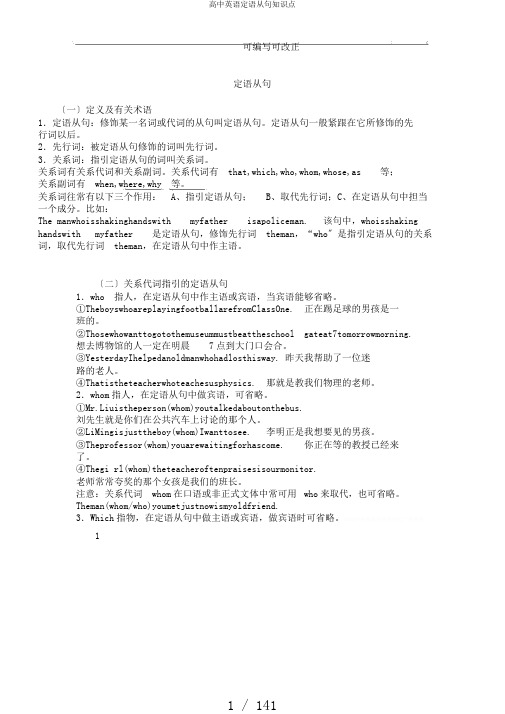
可编写可改正定语从句〔一〕定义及有关术语1.定语从句:修饰某一名词或代词的从句叫定语从句。
定语从句一般紧跟在它所修饰的先行词以后。
2.先行词:被定语从句修饰的词叫先行词。
3.关系词:指引定语从句的词叫关系词。
关系词有关系代词和关系副词。
关系代词有that,which,who,whom,whose,as 等;关系副词有when,where,why 等。
关系词往常有以下三个作用:A、指引定语从句;B、取代先行词;C、在定语从句中担当一个成分。
比如:The manwhoisshakinghandswith myfather isapoliceman. 该句中,whoisshaking handswith myfather 是定语从句,修饰先行词theman,“who〞是指引定语从句的关系词,取代先行词theman,在定语从句中作主语。
〔二〕关系代词指引的定语从句1.who 指人,在定语从句中作主语或宾语,当宾语能够省略。
①TheboyswhoareplayingfootballarefromClassOne.正在踢足球的男孩是一班的。
②Thosewhowanttogotothemuseummustbeattheschool gateat7tomorrowmorning.想去博物馆的人一定在明晨7点到大门口会合。
③YesterdayIhel pedanoldmanwhohadlosthisway. 昨天我帮助了一位迷路的老人。
④Thatistheteacherwhoteachesusphysics.那就是教我们物理的老师。
2.whom指人,在定语从句中做宾语,可省略。
①Mr.Liuistheperson(whom)youtalkedaboutonthebus.刘先生就是你们在公共汽车上讨论的那个人。
②LiMingisjusttheboy(whom)Iwanttosee.李明正是我想要见的男孩。
③Theprofessor(whom)youarewaitingforhascome. 你正在等的教授已经来了。
高中英语定语从句知识点总结
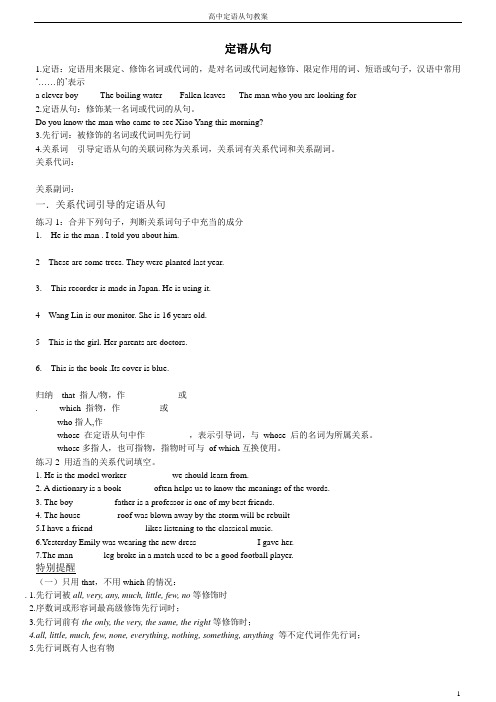
定语从句1.定语:定语用来限定、修饰名词或代词的,是对名词或代词起修饰、限定作用的词、短语或句子,汉语中常用‘……的’表示a clever boy The boiling water Fallen leaves The man who you are looking for2.定语从句:修饰某一名词或代词的从句。
Do you know the man who came to see Xiao Yang this morning?3.先行词:被修饰的名词或代词叫先行词4.关系词引导定语从句的关联词称为关系词,关系词有关系代词和关系副词。
关系代词:_________ _________ _________ ___________ _________关系副词:______ ___________ __________一.关系代词引导的定语从句练习1:合并下列句子,判断关系词句子中充当的成分1. He is the man . I told you about him.2 These are some trees. They were planted last year.3. This recorder is made in Japan. He is using it.4 Wang Lin is our monitor. She is 16 years old.5 This is the girl. Her parents are doctors.6. This is the book .Its cover is blue.归纳that 指人/物,作___________ 或_________. which 指物,作_________或_________who指人,作____________whose 在定语从句中作__________,表示引导词,与whose 后的名词为所属关系。
whose多指人,也可指物,指物时可与of which互换使用。
高中英语语法:定语从句精华知识点复习
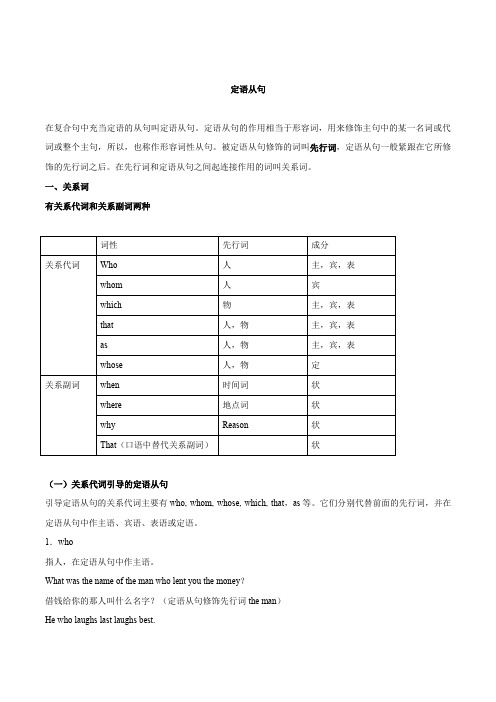
定语从句在复合句中充当定语的从句叫定语从句。
定语从句的作用相当于形容词,用来修饰主句中的某一名词或代词或整个主句,所以,也称作形容词性从句。
被定语从句修饰的词叫先行词,定语从句一般紧跟在它所修饰的先行词之后。
在先行词和定语从句之间起连接作用的词叫关系词。
一、关系词有关系代词和关系副词两种(一)关系代词引导的定语从句引导定语从句的关系代词主要有who, whom, whose, which, that,as等。
它们分别代替前面的先行词,并在定语从句中作主语、宾语、表语或定语。
1.who指人,在定语从句中作主语。
What was the name of the man who lent you the money?借钱给你的那人叫什么名字?(定语从句修饰先行词the man)He who laughs last laughs best.谁笑到最后谁笑得最好。
(定语从句修饰先行词he)The chairman of the meeting, who spoke first, sat on my right.会议主席坐在我右边,他先发言。
(定语从句修饰先行词the chairman)2.whom指人,在定语从句中做宾语。
在口语或非正式文体中,whom可省略或可用who来代替,但在介词后面以及在非限制性定语从句中只能用whom。
There are some people (whom/who)we like and others (whom/who) we dislike.有些人我们是喜欢的,有些人则是我们讨厌的。
(定语从句分别修饰先行词people, others)The people whom I work with are all friendly.和我一起工作的人都很友好。
(定语从句修饰先行词the people,介词后)Mr Carter, whom I spoke to on the phone last night, is very interested in our plan.昨晚我在电话里和卡特先生交谈过,他对我们的计划很感兴趣。
英语语法高中定语从句知识点归纳总结
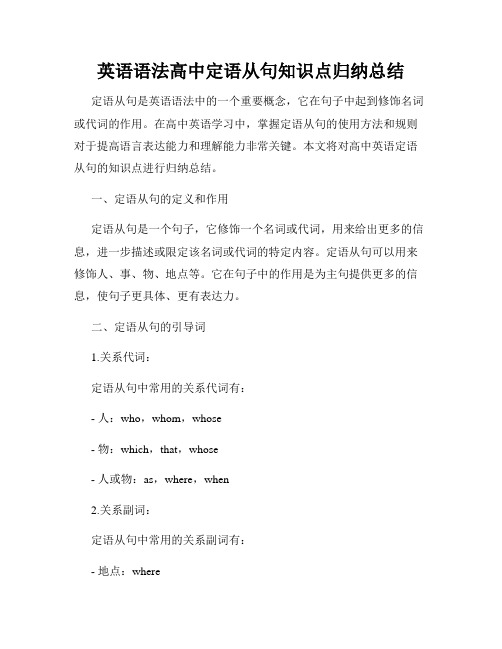
英语语法高中定语从句知识点归纳总结定语从句是英语语法中的一个重要概念,它在句子中起到修饰名词或代词的作用。
在高中英语学习中,掌握定语从句的使用方法和规则对于提高语言表达能力和理解能力非常关键。
本文将对高中英语定语从句的知识点进行归纳总结。
一、定语从句的定义和作用定语从句是一个句子,它修饰一个名词或代词,用来给出更多的信息,进一步描述或限定该名词或代词的特定内容。
定语从句可以用来修饰人、事、物、地点等。
它在句子中的作用是为主句提供更多的信息,使句子更具体、更有表达力。
二、定语从句的引导词1.关系代词:定语从句中常用的关系代词有:- 人:who,whom,whose- 物:which,that,whose- 人或物:as,where,when2.关系副词:定语从句中常用的关系副词有:- 地点:where- 时间:when- 原因:why三、定语从句的基本结构定语从句的基本结构为:关系代词/副词 + 主句。
其中,关系代词或副词在定语从句中担任主语、宾语、表语或定语的作用。
四、定语从句的几个常见类型1.限制性定语从句:限制性定语从句用来对先行词进行进一步的限定,它的信息是先行词不可或缺的一部分。
限制性定语从句与主句之间没有逗号隔开,通常使用关系代词that,也可使用which或who。
例子:The book that you borrowed from me is very interesting.你从我这里借的那本书非常有趣。
2.非限制性定语从句:非限制性定语从句用来对先行词进行附加说明,它的信息只是对先行词的附加补充,可以省略而不影响句子的整体意思。
非限制性定语从句与主句之间用逗号隔开,通常使用关系代词which,也可使用who。
例子:The weather, which was sunny and warm, made our picnic very enjoyable.天气晴朗温暖,使得我们的野餐非常愉快。
高中定语从句知识点

高中定语从句知识点在英语学习中,定语从句是一个非常重要的语法知识点。
掌握了定语从句的使用方法和注意事项,可以帮助我们更准确地表达和理解句子的含义。
下面将介绍一些高中常见的定语从句知识点。
一、定语从句的基本概念定语从句是用来修饰名词或代词的从句,它像一个形容词,对先行词进行修饰和说明。
定语从句一般由关系代词(如that, which, who, whom, whose等)或关系副词(如where, when, why等)引导。
二、定语从句的引导词1.关系代词a. that:常用于修饰人和物,在从句中作主语或宾语时均可使用。
例句:The book that you borrowed from the library is very interesting.b. which:常用于修饰事物,在从句中作主语或宾语时均可使用。
例句:I bought a new car, which is very expensive.c. who/whom:常用于修饰人,在从句中作主语或宾语时使用。
例句:The girl who is sitting next to me is my best friend.2.关系副词a. where:表示地点。
例句:This is the school where I used to study.b. when:表示时间。
例句:The day when I met you was the happiest day of my life.c. why:表示原因。
例句:I don't know the reason why he left without saying goodbye.三、定语从句的位置定语从句可以放在先行词之前或之后。
1. 先行词在定语从句之前时,用逗号将其与定语从句隔开。
例句:Jane, who is my best friend, is coming to visit me tomorrow.2. 先行词在定语从句之后时,不使用逗号。
高中英语定语从句总结
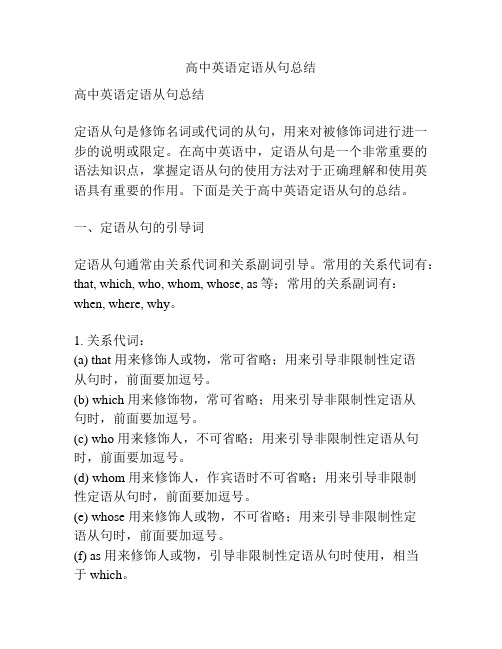
高中英语定语从句总结高中英语定语从句总结定语从句是修饰名词或代词的从句,用来对被修饰词进行进一步的说明或限定。
在高中英语中,定语从句是一个非常重要的语法知识点,掌握定语从句的使用方法对于正确理解和使用英语具有重要的作用。
下面是关于高中英语定语从句的总结。
一、定语从句的引导词定语从句通常由关系代词和关系副词引导。
常用的关系代词有:that, which, who, whom, whose, as等;常用的关系副词有:when, where, why。
1. 关系代词:(a) that 用来修饰人或物,常可省略;用来引导非限制性定语从句时,前面要加逗号。
(b) which 用来修饰物,常可省略;用来引导非限制性定语从句时,前面要加逗号。
(c) who 用来修饰人,不可省略;用来引导非限制性定语从句时,前面要加逗号。
(d) whom 用来修饰人,作宾语时不可省略;用来引导非限制性定语从句时,前面要加逗号。
(e) whose 用来修饰人或物,不可省略;用来引导非限制性定语从句时,前面要加逗号。
(f) as 用来修饰人或物,引导非限制性定语从句时使用,相当于which。
2. 关系副词:(a) when 引导时间定语从句,相当于“at/in/on which”。
(b) where 引导地点定语从句,相当于“in/at/to which”。
(c) why 引导原因定语从句,相当于“for which”。
二、定语从句的种类定语从句分为限制性定语从句和非限制性定语从句。
1. 限制性定语从句是对被修饰词起限定作用的从句,如果去掉定语从句,主句的意思会不完整或不明确。
限制性定语从句使用关系代词that, which, who等引导。
关系代词在定语从句中可以作为主语、宾语、表语或定语。
例句:This is the book that I bought yesterday.这是我昨天买的书。
2. 非限制性定语从句则是对被修饰词进行进一步补充说明,如果去掉定语从句,主句的意思仍然是完整的。
高中英语知识点归纳定语从句的用法
高中英语知识点归纳定语从句的用法定语从句是英语中常见的一种从句。
它用来对主句中的名词或代词进行修饰和限定,使语言更加精确和具体。
本文将对高中英语中关于定语从句的用法进行归纳总结。
一、定语从句的概念定语从句是一个以关系词引导的从句,修饰或限定前面的名词或代词,起到进一步解释、补充信息的作用。
关系词包括:who、whom、which、whose、that等。
二、定语从句的引导词1. 关系代词who指代人,whom在从句中做宾语,which指代物,可以指代整个主句或从句中的一个成分,that既可以指人也可以指物。
2. 关系副词where表示地点,when表示时间,why表示原因。
三、定语从句的位置1. 当修饰主句中的主语时,定语从句位于被修饰名词之后。
例句:The boy who is playing football is my brother.(正在踢足球的那个男孩是我弟弟。
)2. 当修饰主句中的宾语时,定语从句位于被修饰名词之后。
例句:I bought a book which was written by J.K. Rowling.(我买了一本J.K.罗琳写的书。
)3. 当修饰主句中的宾语时,定语从句位于被修饰名词之前。
例句:I saw the girl whom I met yesterday.(我看到了昨天遇到的那个女孩。
)四、限制性定语从句与非限制性定语从句1. 限制性定语从句用来对名词进行修饰和限定,如果去掉不影响主句的完整性。
被从句修饰的名词不能省略。
例句:The book that I bought yesterday is very interesting.(昨天我买的那本书非常有趣。
)2. 非限制性定语从句用来对名词进行陈述和补充说明,去掉会影响句子的意思和完整性。
被从句修饰的名词可以省略。
例句:Tom, who is a doctor, works in a hospital.(汤姆是个医生,在一家医院工作。
高中英语语法:定语从句知识点
高中英语语法:定语从句知识点在复合句中,修饰某一名词或代词,用作定语的从句叫做定语从句(attributive clause)。
被定语从句所修饰的词叫做先行词(antecedent)。
定语从句必须放在先行词之后。
引导定语从句的关联词有关系代词who、whom、whose、which、that 和关系副词when、where、why等。
一、关系代词和关系副词的功能关系代词和关系副词功能有三个:1)用来引导定语从句,在先行词和定语从句之间起纽带作用,使二者联系起来。
2)关系代词和关系副词可作定语从句的一个成分。
关系代词可作主语、宾语、定语;关系副词可作状语。
3)关系代词和关系副词在从句中代替在他前面的先行词。
1、作主语关系代词在定语从句中作主语时,从句的谓语动词的人称和数应与先行词一致。
All that is needed is a supply of oil.所需要的是大量的油。
(引导词that在句中作主语)The foreigner who visited our class yesterday is from Canada. 昨天到我班来访的外国人来自加拿大。
(引导词who在句中作主语)2、作宾语在定语从句里作宾语的关系代词在口语中常被省去The noodles (that) I cooked were delicious. 我煮的面条美味可口。
(引导词that,可省略)The fish (which) we bought wes not fresh. 我们买的鱼不新鲜。
(引导词which,可省略)3、作定语关系代词whose在定语从句中作定语用。
This is the boy whose mother is our Chinese teacher. 这就是那个男孩,他母亲是我们的语文老师。
注意:关系代词whose在从句中与它所修饰的词一起作介词宾语时,可以跟介词放在主语和从句之间。
The boss in whose company Mr. Kang worked called at the hospital. 老板到医院拜访了康先生,康先生在他的公司里工作。
高中英语定语从句知识点总结
定语从句是高中英语语法中的一个重要知识点,它用于修饰名词或代词,起到限定或说明的作用。
以下是高中英语定语从句的知识点总结:1. 定语从句的基本结构:定语从句通常由关系代词(who, whom, whose, which, that)或关系副词(when, where, why)引导,它们在句子中充当主语、宾语、定语或状语等成分。
2. 关系代词的用法:- who, whom 用于指人,who 在定语从句中作主语或宾语,whom 在定语从句中作宾语。
- whose 用于指人或物,在定语从句中作定语,表示所属关系。
- which 用于指物,在定语从句中作主语或宾语。
- that 既可以指人也可以指物,在定语从句中作主语、宾语或表语。
3. 关系副词的用法:- when 表示时间,在定语从句中作时间状语。
- where 表示地点,在定语从句中作地点状语。
- why 表示原因,在定语从句中作原因状语。
4. 定语从句的省略:当关系代词在定语从句中作宾语时,可以省略。
5. 定语从句与先行词的隔离:当先行词与定语从句之间被其他词隔开时,可以使用“介词+关系代词”的结构。
6. 定语从句的倒装:当关系代词在定语从句中作主语时,有时为了保持句子平衡,可以将定语从句倒装。
7. 定语从句的主谓一致:定语从句中的谓语动词应该与先行词在人称和数上保持一致。
8. 非限制性定语从句:非限制性定语从句与先行词之间用逗号隔开,起补充说明的作用。
以上是高中英语定语从句的知识点总结,希望对你有所帮助。
在学习定语从句时,还需要通过大量的练习来巩固和掌握这些知识点。
高中英语语法基础 ——定语从句知识点总结归纳讲解(附同步练习)(有答案)
高中英语语法基础——定语从句知识点归纳讲解(附同步练习)★先行词:被定语从句修饰的名词或代词叫先行词。
通常情况下,引导词前面的名词即为从句的先行词。
★关系词:引导定语从句的词叫关系词。
也可以称作引导词。
①关系代词:who,whom,which,that,whose,as,在从句内作主语、宾语等名词性成分。
②关系副词:when,where,why在从句内作状语。
(一). 使用who、whom、which、that的定语从句1. whoThis is the boy who plays basketball very well.This is the teacher who is teaching us English.▲who 指人, 在从句中作主语。
2. whomThis is the boy (whom) I often help.The man is our headmaster (whom) you met just now.I met the girl (whom) you often praise.▲whom 指人,在从句中作宾语, 可省略。
3. whichThis is the farm which keeps many cows.This is the farm (which ) I visit every year.▲which 指事物, 在从句中作主语或宾语,作宾语时可省略。
4. that以上三种情况均可用that。
指人或指物,可作主语和宾语,作宾语时可省略。
(二). 使用whose的定语从句Do you know the girl whose father is mayor.I used to work in an office whose window faces north.I work in a school whose students are excellent.▲whose 指人或物的所属关系,表示“某人的”或“某物的”。
- 1、下载文档前请自行甄别文档内容的完整性,平台不提供额外的编辑、内容补充、找答案等附加服务。
- 2、"仅部分预览"的文档,不可在线预览部分如存在完整性等问题,可反馈申请退款(可完整预览的文档不适用该条件!)。
- 3、如文档侵犯您的权益,请联系客服反馈,我们会尽快为您处理(人工客服工作时间:9:00-18:30)。
定语从句的连接词不可以用what.关系词有关系代词和关系副词。
关系代词有that, which, who, whom, whose, as等;关系副词有where, when, why等。
二.关系代词引导的定语从句指人,在从句中做主语(1) The boys who are playing football are from Class One.…(2) Yesterday I helped an old man who lost his way.2. whom指人,在定语从句中充当宾语,常可省略。
(1) Mr. Liu is the person (whom) you talked about on the bus.(2) Mr. Ling is just the boy whom I want to see.注意:关系代词whom在口语和非正式语体中常用who代替,可省略。
(3) The man who/whom you met just now is my friend./3. which指物,在定语从句中做主语或者宾语,做宾语时可省略(1) Football is a game which is liked by most boys.(2) This is the pen (which) he bought yesterday.4. that指人时,相当于who或者whom;指物时,相当于which。
在宾语从句中做主语或者宾语,做宾语时可省略。
(5) The number of the people that/who come to visit the city each year rises one million.(6) Where is the man that/whom I saw this morning@5. whose通常指人,也可指物,在定语从句中做定语(1) He has a friend whose father is a doctor.(2) I once lived in a house whose roof has fallen in.whose指物时,常用以下结构来代替(3) The classroom whose door is broken will soon be repaired.(4) The classroom the door of which is broken will soon be repaired.(5) Do you like the book whose cover is yellow(6) Do you like the book the color of which is yellow^三.介词+关系代词引导的定语从句关系代词在定语从句中做介词宾语时,从句常由介词+关系代词引导(1) The school (that/which) he once studied in is very famous.(2) The school in which he once studied is very famous.(3) Tomorrow I will bring here a magazine (that/which) you asked for.(4) Tomorrow I will bring here a magazine for which you asked.(5) We”ll go to hear the famous singer (whom/that/wh o) we have often talked about."(6) We”ll go to hear the famous singer about whom we have often talked.注意:1.含有介词的动词短语一般不拆开使用,如:look for, look after, take care of(1) This is the watch which/that I am looking for. (T)(2) This is the watch for which I am looking. (F)2.若介词放在关系代词前,关系代词指人时用whom,不可用who或者that;指物时用which,不能用that;关系代词是所有格时用whose(1) The man with whom you talked is my friend. (T)(2) The man with who/that you talked is my friend. (F)【(3) The plane in which we flew to Canada is very comfortable. (T)(4) The plane in that we flew in to Canada is very comfortable. (F)3.“介词+关系代词”前可有some, any, none, both, all, neither, most, each, few等代词或者数词(1) He loved his parents deeply, both of whom are very kind to him.(2) In the basket there are quite many apples, some of which have gone bad.(3) There are forty students in our class in all, most of whom are from big cities.$四.关系副词引导的定语从句1. when指时间,在定语从句中做时间状语(1) I still remember the day when I first came to the school.(2) The time when we got together finally came.2. where指地点,在定语从句中做地点状语(1) Shanghai is the city where I was born.(2) The house where I lived ten years ago has been pulled down.#3. why指原因,在定语从句中做原因状语(1) Please tell me the reason why you missed the plane.(2) I don”t know the reason w hy he looks unhappy today.注意:关系副词引导的从句可以由“介词+关系代词”引导的从句替换(1) The reason why/ for which he refused the invitation is not clear,(2) From the year when/in which he was going to school he began to know what he wanted when he grew up.(3) Great changes have taken place in the city in which/where I was born.…五.限制性定语从句和非限制性定语从句限制性定语从句举例:(1) The teacher told me that Tom was the only person that I could depend on.(2) China is a country which has a long history.非限制性定语从句举例:(1) His mother, who loves him very much, is strict with him.(2) China, which was founded in 1949, is becoming more and more powerful.要注意区分以下几个句子的不同(1) His brother who is now a doctor always encourages him to go to college.他那当医生的哥哥常鼓励他要考上大学。
(他还有其他的哥哥)(2) His brother, who is now a doctor, always encourages him to go to college.他的哥哥是当医生的,常鼓励他要考上大学。
(他只有一个哥哥)]难点分析(一)限制性定语从句只能用that的几种情况1.当先行词是anything, everything, nothing (something除外), few, all, none, little, some等代词时,或者是由every, any, all, some, no, little, few, much等修饰时(1) Have you taken down everything that Mr. Li has said(2) There seems to be nothing that seems impossible for him in the world.(3) All that can be done has been done.\(4) There is little that I can do for you.注意:当先行词指人时,偶尔也可以用who(4) Any man that/.who has a sen se of duty won”t do such a thing.2.当先行词被序数词修饰(1) The first place that they visited in London was the Big Ben.3.当先行词被形容词最高级或比较级修饰时¥(1) This is the best film that I have seen.4.当先行词被very, only修饰时(1) This is the very dictionary that I want to buy,(2) After the fire in his house, the old car is the only thing that he owned.当先行词指人时,偶尔也可以用who(3) Wang Hua is the only person in our school who will attend the meeting/(5.当先行词前面有who, which等疑问代词时(1) Who is the man that is standing there(2) Which is the T-shirt that fits me most6.当先行词既有人,也有动物或者物体时(1) Can you remember the scientist and his theory that we have learned只用which, whom1. .当先行词有限定性修饰词时what was the name of the war in the USA which lasted 5 years2. 当先行词是one, ones, anyone,等时用who; those做先行词时,指人用who, 指物用which Those who want to go to the Great Wall sign up here.He who has never been to the Great Wall is not a true man.3. 介词+which, whom(二)关系代词as和which引导的定语从句。
